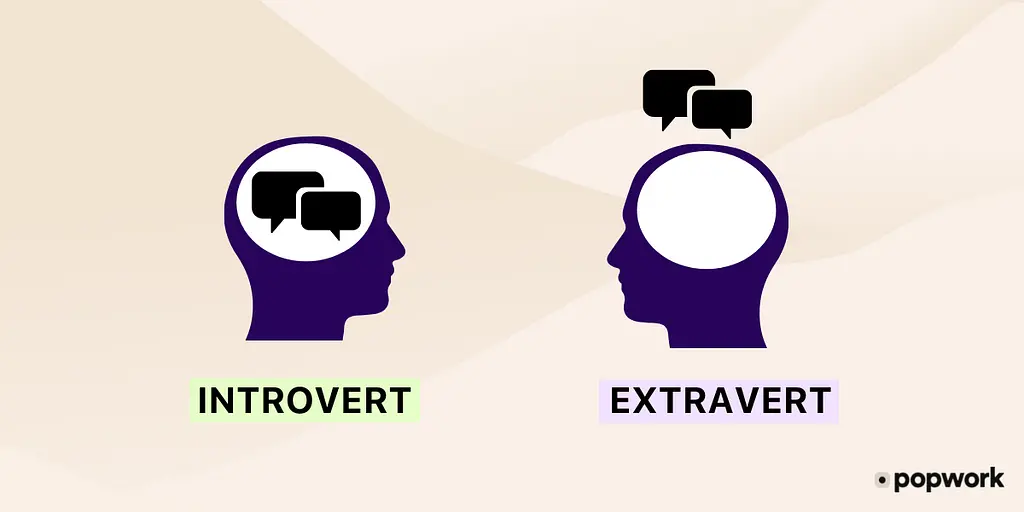Meaning of Introversion
Introversion is a fundamental aspect of one's personality and refers to a preference for solitude and internal reflection to recharge and find inspiration. Introverts thrive in quieter, less stimulating environments and focus their energy inwardly.

The word introversion tends to be misunderstood in a world that often celebrates extroversion and outward expression. Far from being a mere personality trait, introversion encompasses a profound and complex way of interacting with the world. This blog post aims to explore the multifaceted meaning of introversion, debunk common misconceptions, and celebrate the unique strengths it brings.
Understanding Introversion: More Than Shyness
Introversion is a personality trait characterized by a focus on internal feelings rather than external sources of stimulation. Psychologist Carl Jung popularized the term in the early 20th century. Unlike the word counter in a blog post that quantifies how often words appear, introversion isn't about the frequency of social interactions but the way individuals recharge and reflect.
Contrary to popular belief, being an introvert doesn't necessarily mean being shy or antisocial. Instead, introverts may feel more energized by solitary activities or small group interactions rather than large social gatherings. They often process their thoughts internally and may take longer to open up in social situations.
Research suggests that introversion is partly influenced by genetics and brain chemistry. Studies have shown that introverts may have a higher sensitivity to dopamine, meaning they require less of it to feel happy and stimulated. This biological basis helps explain why introverts might prefer less stimulating environments.
Misconceptions and Myths About Introversion
A common misconception is equating introversion with shyness. While some introverts may be shy, shyness is about the fear of social judgment, whereas introversion is about how energy is gained or drained in social situations.
Another myth is that introverts are anti-social. In reality, introverts value deep, meaningful relationships and often thrive in one-on-one interactions or small groups. Their preference for quality over quantity in social interactions should not be mistaken for a dislike of socializing.
Introversion and Creativity
Introverts are often deeply creative and reflective. Their tendency to look inward and explore their thoughts and feelings can lead to rich creativity. Many artists, writers, and innovators identify as introverts, using their introspective nature to fuel their creative processes.
Solitude is a crucial ingredient for creativity, and introverts naturally embrace this quiet space. This comfort with solitude allows introverts to explore ideas deeply, think critically, and develop unique perspectives.
Introversion in the Workplace
The modern workplace often favors extroverted traits like assertiveness and gregariousness. However, introverts bring their own set of strengths to the table, including deep concentration, careful problem-solving, and thoughtful decision-making.
Introverted leaders are known for their empathetic and thoughtful approach. They may lead by example, listen attentively, and create an inclusive environment that values each team member's input.
Creating an introvert-friendly workplace involves recognizing the value of quiet spaces, allowing time for thoughtful deliberation, and appreciating diverse working styles. This not only benefits introverts but enriches the work culture as a whole.
Introversion in Relationships
In relationships, introverts often seek depth and authenticity. They may prefer to connect on a deeper level, seeking out conversations that go beyond small talk and foster a genuine understanding of others.
Relationships between introverts and extroverts can be complementary, with each bringing a unique approach to interaction and problem-solving. Understanding and respecting each other's preferences is key to a harmonious dynamic.
Relationships between introverts and extroverts can be complementary, with each bringing a unique approach to interaction and problem-solving. Understanding and respecting each other's preferences is key to a harmonious dynamic.
Conclusion
In conclusion, introversion is a complex and nuanced trait that encompasses how individuals interact with the world around them. It's about where one finds energy, comfort, and inspiration. Recognizing and valuing the strengths of introversion is crucial in a society that often prioritizes extroverted qualities.
By embracing the quiet power of introversion, we open ourselves to a world of deep thought, creativity, and meaningful connections. Whether in the workplace, relationships, or personal growth, understanding and appreciating the introverted perspective enriches our interactions and broadens our understanding of the diverse tapestry of human personality.
Remember, being an introvert is not a limitation; it's an incredible gift.
Published on
Updated on